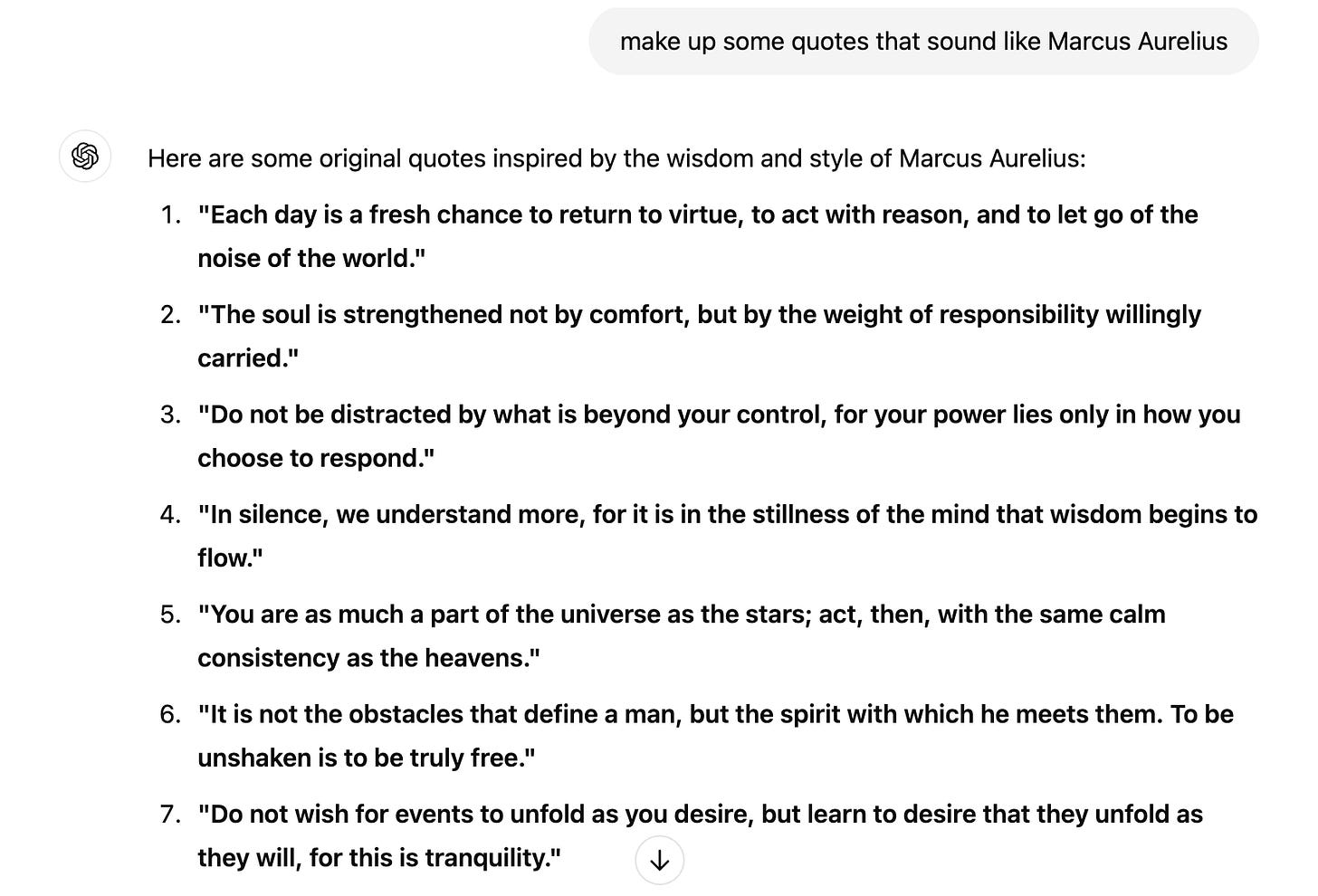Does the Far Right even need antiquity now that they have generative AI?
In two weeks, Not All Dead White Men will be six years old. A lot has changed in that time in the digital landscape of the Far Right — unfortunately, we don’t even need to talk about “the alt-right” anymore, now that Tucker Carlson and his ilk have done the work of mainstreaming ideas that used to sound like Nazi trolling. The “Red Pill” community has also been mainstreamed, in a way that can maybe best be encapsulated (lol) by this tweet from 2020:
But a lot is still the same. In my book I analyzed how the Right looks to the classics to self-mythologize, projecting their values onto an idealized and warped classical past. No matter that the past they create is pure fantasy: antiquity was diverse, multicultural, gay as hell, and definitely not just dudes playacting The 300 over and over again. But they’re not about to let a little thing like actual historical knowledge get in the way of a good story that makes them feel like their misogyny, xenophobia, racism, and homophobia are justified because they’re rooted in ancient precedent. That trend has definitely continued in the past six years — rhetoric about “saving Western civilization” has only intensified.
But that might be starting to change.
Last week, the AfD, Germany’s far-right party that nobody wants to sit next to in Parliament, tweeted a video created using generative AI that celebrates a romanticized white Germany that used to exist — and, they hint, could exist again, if they gain even more power than they already have — when strong-jawed Aryan men walked through verdant fields hand-in-hand with their grandmothers. These images stand in contrast with today, when Germany is filled with knife-wielding immigrants and pride flags.
Joel Swanson, a professor at Sarah Lawrence, tweeted, “It's kind of telling how the far-right AfD's fantasized vision of the German past is all AI-generated, because they can't show actual photos of the German past to which they want to return.” Which seems exactly right to me. None of the pasts the Right clings to ever really existed. They’re just dressing up their dystopian vision for the future in old-timey cosplay.
But the AfD video makes me wonder: if they can create their idealized past using generative AI, maybe they don’t even need the classics anymore?
Antiquity is useful for the self-mythologizer because it comes pre-mythologized. Just add your ideology and shake until combined, then pour over ice, and you have a perfect cocktail of myth-inflected bullshit to justify your bigotry. It’ll taste familiar to a lot of people, because images and stories from antiquity are so baked into our cultural psyche. But if you can use AI to create a movie that shows your alternate history vision perfectly, you can skip the intermediary step.
I think that in the coming years we could see a lot less far-right classical appropriation. Which will be a relief for my colleagues, I’m sure. The appropriation we do see will probably be even shallower and hollower than it has been — a grim thought, honestly, because fact-checking that shit has always been an exercise in misery. Way back in 2017 I wrote an article for Eidolon called “Learn Some F*cking History” about how pointless this kind of fact-checking is, and honestly, the situation has only gotten worse since then. Bill Beck wrote about fake Homer quotes for Eidolon in 2018. Now in 2024, fake quotations purporting to be from Marcus Aurelius or Aristotle or Cicero seem to far outnumber real ones, and it’s become trivial to use AI to create more. Watch me!
Honestly, I’m pretty sure any one of those could fool not only most laymen, but most classical scholars. I did extensive research on Marcus Aurelius for my book, and they sound pretty damn good to me. Good enough that for I moment I wondered if some of them might be close to or heavily based on actual quotes.
Now I’m tempted to tell ChatGPT to translate these into Latin and dump them on some right-wing forum and see if anybody notices that A) the Latin is gibberish, B) the quotes are fake, and C) Marcus Aurelius wrote in Greek. Maybe I can convince one of them to get a tattoo of my fake quote!
In a way, the generative AI situation is nothing new for how extremists interact with ancient history. In the Eidolon article I mentioned before, I briefly discuss a Twitter kerfluffle between eminent classics professor Mary Beard and an InfoWars editor convinced that her expertise is worth less than a bunch of drawings of white people in 40-year-old history textbooks for helping us envision what people looked like in antiquity. Now we’ve just replaced the artists who made those old textbook drawings with unimaginably powerful computers. Plus ca change, etc.
AI is the perfect replacement for bad fake history because neither of them care if they’re just bullshit. I guarantee that zero AfD voters would care about Swanson’s excellent analysis. Appeals to the reality of history are just as useless as grammar teachers pointing out that nearly every sentence out of Trump’s mouth is gibberish. The people he’s speaking to don’t care, because they’re single-issue voters, and that issue is immigration, and the safety of pets in Springfield matters far less than the anti-immigrant sentiment that underlies it. Pair the hateful rhetoric with a fantasy of a world without immigrants and their objectively superior food (seriously, imagine Germany without döner), and you’ve got a recipe for votes.
Suddenly, I’m remembering why I stopped specializing in this material after Not All Dead White Men and started making jokes about the plural of “octopus”. Between convincing people not to use the non-word “octopi” and convincing people not to mythologize ancient history using all the technology available to them, I know which is the more pointless exercise.






Reading this I was struck by the fact that I haven't bought your book yet! Why haven't I done that! Anyway, going to buy a copy of your book now.
Three years ago, I was approached by a well-known (in Europe) publisher who asked if I was interested in writing a kind of “instant book” about the debate surrounding Classics, far-right appropriation, and the so-called Cancel Culture in the US. They told me they wanted the perspective of a (relatively) young (I was 37 at the time) female Classics professor with some international experience. I remember being scared to death at the time because I felt like I was entering a campo minato—a minefield—where the risk of jeopardizing my credibility and career, in a context prone to constant misunderstandings, was immense.
In the end, I accepted. Despite the enormous risks, I suspected that if I didn’t seize the opportunity, soon enough the usual white middle-aged male colleagues—who had far fewer concerns about objectivity—would weigh in on the topic. And indeed, that's exactly what happened.
To make a long story short: I published my book, where I aimed to neutrally explain to a European audience the gravity of far-right appropriation, not just in the US but globally. I highlighted how, especially after Trump’s election, a part of the academic community felt a renewed urgency to find a way of "being a good Classicist under a bad emperor," to quote one of your must-read pieces in Eidolon (which I quoted frequently, to be honest, since there’s nothing comparable in the Europe-born context).
The book was published, and I toured schools, universities, bookstores, radio stations, and TV shows. I met countless people, most of whom were kind and engaged. The real issue, however, is that there's a hardcore group—even among progressives and leftists—who, stirred up by the media (left-leaning too!), have completely lost sight of the cultural appropriation of antiquity by the far-right (not only in the US). Instead, they’ve swallowed the narrative that “woke” American Classicists are self-hating and jeopardizing the very existence of a discipline already in decline. The enemy, for them, isn’t the far-right, but the so-called Cancel Culture, which they see as "a threat to everything beautiful and noble—like the Classics".
In short, the conversation about the need to make the discipline more inclusive has been widely lost in translation as it crossed the Atlantic. More books have since come out—written by middle-aged white men, full professors (to this day, mine remains the only one written by a woman, and I'm far from a powerhouse in the field)—in which they explain to the public how Americans are victims of wokism, DEI policies, Cancel Culture and other perceived absurdities. They argue that the debate on Classics as a field and discipline is merely a product of that "suicidal woke culture." And these are people politically aligned with the left. So are their readers.
I don’t know whether AI will mark the end of cultural appropriation, but the damage it has already done—particularly in constructing a narrative that Europe has largely misunderstood—remains vast.